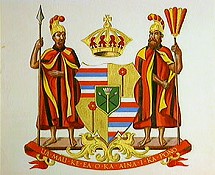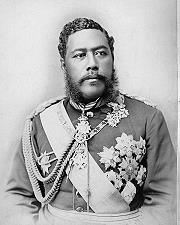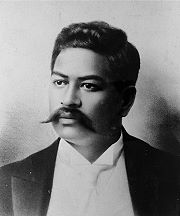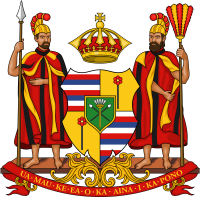The Kingdom of Hawai’i History
 In 1843 Hawai`i became the first non-European indigenous state to be admitted into the Family of Nations when Great Britain and France recognized it as an independent nation. Denmark (1846), the United States (1849), Sweden and Norway (1852), Belgium and the Netherlands (1862), Spain (1863), Swiss Confederation (1864), Russia (1869), Japan (1871), Austria-Hungary (1875), and Germany (1879), after unification, did the same.
In 1843 Hawai`i became the first non-European indigenous state to be admitted into the Family of Nations when Great Britain and France recognized it as an independent nation. Denmark (1846), the United States (1849), Sweden and Norway (1852), Belgium and the Netherlands (1862), Spain (1863), Swiss Confederation (1864), Russia (1869), Japan (1871), Austria-Hungary (1875), and Germany (1879), after unification, did the same.
Initially the Kingdom of Hawai`i aligned itself more closely with the European kingdoms, especially the United Kingdom (England) which was also an island kingdom. It was suspicious of the intentions of the United States as it witnessed the slave market and the brutal, unjust treatment of the Negroes even after the Civil War and also the persecution of the “Indians” who often had no legal rights as human beings and could be disposed of like cattle. Native Hawaiians, being dark-skinned, might also be treated as slaves or be looked upon as second-class citizens with the loss of their human rights in a potential take-over by USA interests.
 Already after the USA Civil War powerful American and European businessmen had started to form secret, armed militia in an effort to undermine the Hawaiian Monarchy and protect their business interests. In 1875 the USA and the Kingdom of Hawai`i then ratified a reciprocity treaty that provided for duty-free entry of Hawai`i sugar to the USA and brought great profit for American businessmen and a quick expansion of the sugar industry. To further protect their interests the businessmen forced the 1887 Constitution of the Kingdom of Hawai`i upon King Kalākaua. It became known as the Bayonet Constitution for the use of intimidation by the armed militia which forced the King to sign it or be deposed and perhaps harmed along with his followers. This “constitution”, which was never ratified, pretended to create a constitutional monarchy like that of the United Kingdom. It stripped the Monarchy of much of its authority and gave the power to the legislature and cabinet of the government which was largely controlled by American, European and native Hawaiian elites. This enabled them to pass a new treaty with the USA that gave the USA exclusive use of Pearl Harbor in exchange for continued duty-free import of sugar from Hawai`i. However, in 1890, the USA, in control of Pearl Harbor, passed new legislation that ended the competitive advantages that earlier treaties afforded the Hawai`i sugar industry.
Already after the USA Civil War powerful American and European businessmen had started to form secret, armed militia in an effort to undermine the Hawaiian Monarchy and protect their business interests. In 1875 the USA and the Kingdom of Hawai`i then ratified a reciprocity treaty that provided for duty-free entry of Hawai`i sugar to the USA and brought great profit for American businessmen and a quick expansion of the sugar industry. To further protect their interests the businessmen forced the 1887 Constitution of the Kingdom of Hawai`i upon King Kalākaua. It became known as the Bayonet Constitution for the use of intimidation by the armed militia which forced the King to sign it or be deposed and perhaps harmed along with his followers. This “constitution”, which was never ratified, pretended to create a constitutional monarchy like that of the United Kingdom. It stripped the Monarchy of much of its authority and gave the power to the legislature and cabinet of the government which was largely controlled by American, European and native Hawaiian elites. This enabled them to pass a new treaty with the USA that gave the USA exclusive use of Pearl Harbor in exchange for continued duty-free import of sugar from Hawai`i. However, in 1890, the USA, in control of Pearl Harbor, passed new legislation that ended the competitive advantages that earlier treaties afforded the Hawai`i sugar industry.
The 1887 Bayonet Constitution had already altered eligibility to vote, stipulating property value as another condition of voting eligibility. In addition to native Hawaiians many Asians, such as Japanese and Chinese, who comprised a large proportion of the population and who had previously become naturalized subjects of the Kingdom, were subsequently stripped of their voting rights. This guaranteed a voting monopoly by the moneyed business aristocracy such as wealthy Americans and Europeans who had acquired full voting rights without the need for Hawaiian citizenship. By 1893 Queen Lili`uokalani, with the support of native Hawaiians and disenfranchised naturalized citizens, attempted to install a new constitution and correct these injustices.
On January 17, 1893, Sanford Dole and his committee of local businessmen, fearing a loss of economic and political power, took control of and overthrew the Kingdom of Hawai`i with the help of American Marines and declared itself the Provisional Government of Hawai`i “to rule until annexation by the United States.” Contingencies for such overthrow had already been planned at least since the 1887 Bayonet Constitution and was also made possible with the compliance of the Protestant missionary churches that had sprung up all over Hawai`i since the 1820s. Some of the Queen’s supporters were killed as a result of this supposedly “bloodless revolution” while others were imprisoned. The Queen, wanting to avoid further bloodshed, protested the overthrow to the US government, expecting to be reinstated and justice to prevail:
I, Lili`uokalani, by the Grace of God and under the Constitution of the Hawaiian Kingdom, Queen, do hereby solemnly protest against any and all acts done against myself and the Constitutional Government of the Hawaiian Kingdom by certain persons claiming to have established a Provisional Government of and for this Kingdom. That I yield to the superior force of the United States of America whose Minister Plenipotentiary, His Excellency John L. Stevens, has caused United States troops to be landed at Honolulu and declared that he would support the Provisional Government. Now to avoid any collision of armed forces, and perhaps the loss of life, I do this under protest and impelled by said force yield my authority until such time as the Government of the United States shall, upon facts being presented to it, undo the action of its representatives and reinstate me in the authority which I claim as the Constitutional Sovereign of the Hawaiian Islands.”
 Dole and his co-conspirators lobbied immediately in Washington for annexation to the United States of America while members of the Hawaiian Kingdom lobbied to restore it. USA President Grover Cleveland, a Democrat, considered the overthrow to be an illegal act of war. He refused to consider annexation of the islands and initially attempted to restore the Queen to her throne. The largely Republican business elite then proclaimed Hawai`i the Republic of Hawai`i and decided to wait until President Cleveland’s second term was finished to try again for annexation with a new, hopefully Republican president. On January 5, 1895, native Hawaiian freedom fighters attempted a counterrevolution which failed when some of them were gunned down by the vastly superior forces of the white business elite. Queen Lili`uokalani was arrested on treason charges, was placed under permanent house arrest and was finally forced to abdicate the throne. After the failed coup, the USA staged an invasion of Hawai`i. A puppet government was installed which “ceded” the islands to the USA.
Dole and his co-conspirators lobbied immediately in Washington for annexation to the United States of America while members of the Hawaiian Kingdom lobbied to restore it. USA President Grover Cleveland, a Democrat, considered the overthrow to be an illegal act of war. He refused to consider annexation of the islands and initially attempted to restore the Queen to her throne. The largely Republican business elite then proclaimed Hawai`i the Republic of Hawai`i and decided to wait until President Cleveland’s second term was finished to try again for annexation with a new, hopefully Republican president. On January 5, 1895, native Hawaiian freedom fighters attempted a counterrevolution which failed when some of them were gunned down by the vastly superior forces of the white business elite. Queen Lili`uokalani was arrested on treason charges, was placed under permanent house arrest and was finally forced to abdicate the throne. After the failed coup, the USA staged an invasion of Hawai`i. A puppet government was installed which “ceded” the islands to the USA.
When William McKinley, a Republican, became president on March 4, 1897, it started a predominance of the Republican Party. His Republican Party had already undermined the efforts of President Cleveland to restore the Kingdom of Hawai`i as they strongly supported annexation for the sake of strategic military and economic interests under their doctrine of “Manifest Destiny” (policy of imperialistic expansion justified/defended as necessary or benevolent). At McKinley’s request a new treaty of annexation was signed and sent to Congress for approval. In response, the Hawaiian Patriotic League and its female counterpart petitioned Congress, opposing it. In September and October of that year, Hui Aloha `Āina collected 556 pages for a total of 21,269 signatures of native Hawaiians, or over half of the native residents, opposing annexation. Hui Kālai`āina collected another 17,000 signatures for restoring the monarchy. While they were able to defeat McKinley’s annexation treaty in 1897, Congress, in 1898, passed the Newlands Resolution and illegally annexed the Kingdom of Hawai`i. The USA desired Pearl Harbor and Hawai`i as a strategic Pacific military base during the Spanish-American War and also for their further territorial expansion in the Pacific. Queen Lili`uokalani pointed out that annexing the islands without compensation to the Hawaiian government (and its people) amounted to theft and strongly opposed it.
The quick, forced inclusion of the Hawaiian Islands into the USA was part of a larger system adopted, whereby all colonies of predominantly non-Caucasians were assigned as territories. There was great concern in the US Congress that the new Hawai`i territory could become the first to be ruled by a non-white majority if voting rights would be extended to all (not only white) males who were citizens of the islands in 1898. However, the new territory put rules and regulations in place that largely further disenfranchised the non-white majority, even to the point of forbidding the teaching of the native Hawaiian language in school.
After their short and largely one-sided 1898 war against Spain, the USA, in 1899, also annexed the former Spanish colonies Puerto Rico, Guam and Philippines at the Treaty of Paris while promising freedom to Cuba. Spain ceded its colonial power in the Pacific to the US, making it an imperial power. The new Hawai`i territories continued to serve as an important military base in the subsequent drawn-out brutal war by the US to defeat the Filipino freedom fighters who had previously fought the Spanish for their independence since 1896, had largely supported the Americans during their short war with Spain, and had then felt betrayed by them. This bloody war of independence dragged on into the 20th century and finally resulted in the defeat of the Filipino freedom fighters.
 President McKinley was assassinated in September 1901 at the beginning of his second term in office and his Vice President Theodore Roosevelt became president, continuing the same policies of “Divine Destiny.” Prominent native Hawaiians such as Prince Kuhio and John Henry Wise, while initially strongly opposing the Republican Party, finally joined it in order to have a voice to better the conditions of native Hawaiians. They were successful in their attempt to help establish the Hawaiian Home Commission Act of 1921 that, however, set aside only 200,000 acres of often questionable land for homesteading (Hawaiian Home Lands) so that “Hawaiians could again become self-sufficient, because by nature they were farmers and fishermen and had been forced into the cities through the theft of their lands.” Additional painful business concessions forced on them further disenfranchised Hawaiians and also defined them as persons with 50% or more Hawaiian blood, dividing the Hawaiian community itself. It served the Republican majority well in their continued economic and political control of the islands.
President McKinley was assassinated in September 1901 at the beginning of his second term in office and his Vice President Theodore Roosevelt became president, continuing the same policies of “Divine Destiny.” Prominent native Hawaiians such as Prince Kuhio and John Henry Wise, while initially strongly opposing the Republican Party, finally joined it in order to have a voice to better the conditions of native Hawaiians. They were successful in their attempt to help establish the Hawaiian Home Commission Act of 1921 that, however, set aside only 200,000 acres of often questionable land for homesteading (Hawaiian Home Lands) so that “Hawaiians could again become self-sufficient, because by nature they were farmers and fishermen and had been forced into the cities through the theft of their lands.” Additional painful business concessions forced on them further disenfranchised Hawaiians and also defined them as persons with 50% or more Hawaiian blood, dividing the Hawaiian community itself. It served the Republican majority well in their continued economic and political control of the islands.
The Democratic Party, founded in 1900 in opposition to the overthrow of the Hawaiian Kingdom and to help bring Hawaiian people into government, became the dominant party in Hawai`i after the territory became a USA state in 1959.
In 1993, President Bill Clinton, a Democrat, and the Congress of the United States apologized to native Hawaiians on behalf of the people of the United States “for the overthrow of the Kingdom of Hawai`i and the deprivation of the rights of native Hawaiians to self-determination.”
However, recognition and compensation could not be achieved thereafter largely because of opposition from Republicans in Congress.
 |
Nov. 23, 1993 – President Bill Clinton signs US Public Law 103-150 -the Apology Resolution for the illegal overthrow of the Kingdom of Hawai`i (a key excerpt of which is shown on the back of the Hawaiian Kingdom T-shirts).Left to right: Vice President Al Gore and the Hawaiian delegation to Congress (Daniel Inouye, Patsy Mink, Neil Abercrombie – now governor of Hawai`i- and Daniel Akaka) are witnessing the signing ceremony. |
UA MAU KE EA O KA `ĀINA I KA PONO – The Life of the Land is Perpetuated in Righteousness
Since the 1840s the motto of the Kingdom of Hawai`i and since 1959 also the official motto of the State of Hawai`i, the 50th state of the USA.

